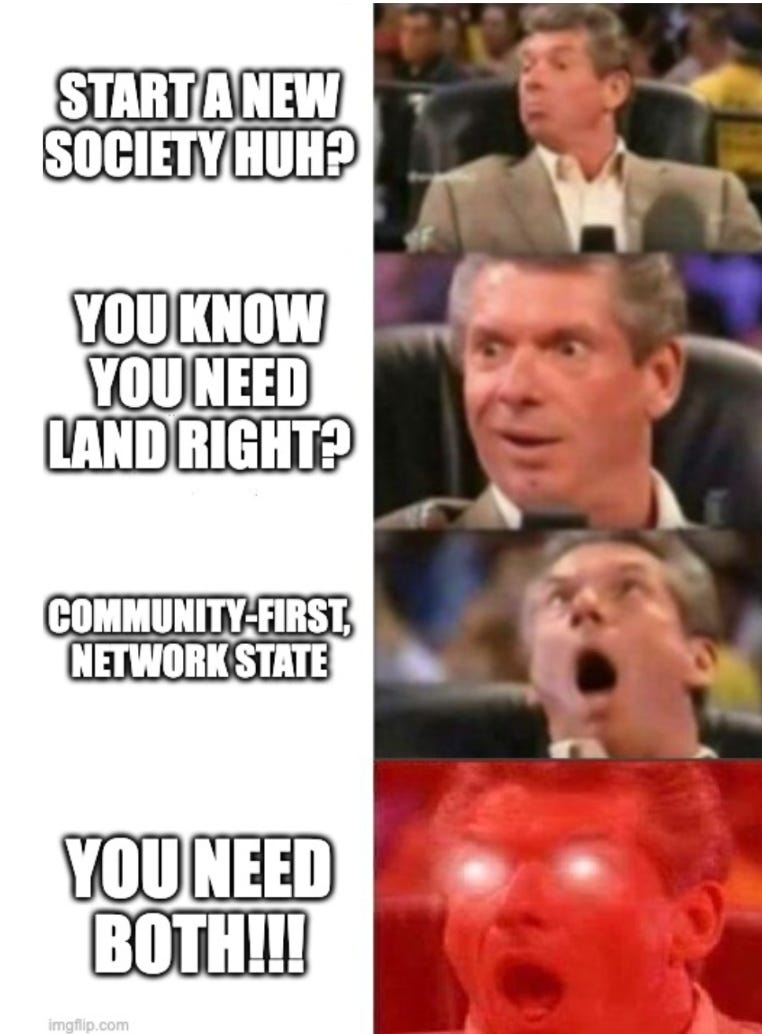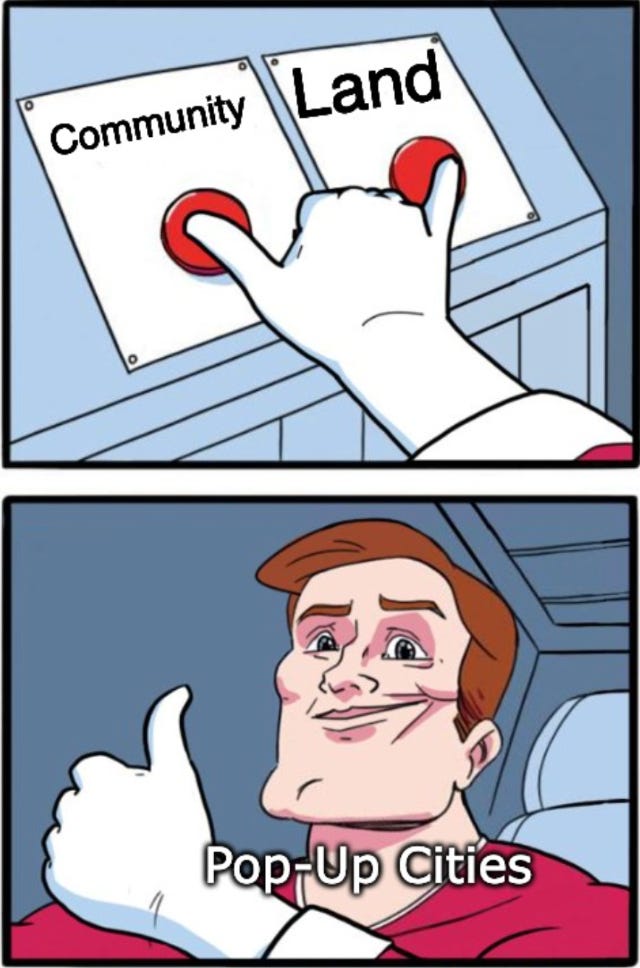How do you build a new city/country/state/jurisdiction*?
*Jurisdiction means you can apply laws & governance to physical territory. You can build cities without jurisdictions, but nothing close to country/state. The reason I like the term jurisdiction over country/state is that it allows degrees of legal autonomy.
The problem with building new cities or jurisdictions is the bridge between demand and infrastructure:
It takes years to get jurisdiction & build infrastructure
Without infrastructure, people don’t come
There have been two strategies to overcome this gap:
Jurisdiction first: have patience & build infrastructure (e.g. Prospera, Itana)
Demand first: start building an online community (e.g. Praxis, Afropolitan)
The challenge is their “staging” strategy (phase 1/2 etc.): what gets you through stage 1 does not get you through stage 2, e.g. co-living & vibey parties require a different skillset than government negotiation or legal structures and complex agreements
Think of it this way: your stage 1 has a 10% chance of success, like a normal startup. However, if your stage 2 success is not correlated to stage 1 success, then you have another risky bet with a 10% chance of success, 10% * 10% = 1% overall.
One way to solve this challenge is the pop-up city model that Vitalik Buterin introduced with “Zuzalu”, a 2-month pop-up city in Montenegro.
Our new project Vitalia represents the first application of this strategy. To succeed, we had to BOTH negotiate complex legal matters with a jurisdiction (Prospera), and we had to be good at galvanizing a highly aligned online community.
The advantage of this is: the cost of failure are low. A pop-up city can be done at a loss of at most 200k (it could even be done profitably). This is something that Vitalia proved to get pre-seed funding from VCs for (soon we can proof seed stage funding).
There are a few lessons from this for other network state builders:
Go IRL from day 1: this is my most contrarian thesis. Online is quick to get you numbers and eyeballs (as Praxis proved), but it’s also quick to dissipate. Physical connections and lasting IRL structures are what create stickiness.
Work with willing jurisdictions: there is plenty of space in Prospera for more projects like Vitalia that build their own infrastructure and bring community. Nomad Nation is doing it too. Cabin is establishing a foothold there.
If you want to work with difficult jurisdictions like the USA, Italy, Brazil etc. you need to be willing and able to sustain yourself without traction for years
Other easy jurisdictions: Uruguary, Zanzibar, Dubai, Palau; or think of jurisdictions worth taking a bet on - they’re not easy but have political momentum and high upside, e.g. Argentina, El Salvador, Montenegro
Community is everything - but put a flag in the ground: you may think you need to build a community for years to have enough demand - but joining a pop-up city is a great commitment signal to know if they’re with it. Your physical location can be the defining feature of your community and will create a feeling of belonging. The minimum time you need to announce and promote a pop-up city is probably 2-3 months, and the minimum viable size is about 50-100 people.
An open question (that I hope to answer within 6-12 months) is: how do you create further stickiness to become a hub with 1.000s of people residing there for a significant part of the year? From a first look at the data, I see 5-10% of Vitalia pop-up city attendees to be willing to move for 6+ months / year. A further 10-30% is willing to spend about 2-3 months / year there, and those numbers increase with infrastructure buildout and network effects (i.e. density, how many other people are there).
This means it remains a challenge in year 1-2 after the pop-up city to build a solidified community in one location. I do expect it will be the same as for most new tech: focus on the most aligned and high-value early adopters, and grow from there.
In Vitalia’s case the biggest value-add group is: businesses that benefit from the medical freedom and flexible regulations in Prospera. Our goal is to have 20 local businesses by EOY 2024, and at that point we expect network effects and growth from these businesses’ employees, customers and community that follows them.
To be continued.





I think the reason people go to a city is for work and not for community. Many people actually leave their friends and family behind for the city. So competing using community is not a viable strategy unless you're just looking to be a tourist destination.
Since a city is just a labour market first and a community as secondary feature, you should probably focus first and foremost on getting investment. This would provide large anchor employers which will attract workers. Hence its probably more important to cultivate relationships with manufacturers, universities, hotel chains etc. that with some random larpers on the internet.
I know this is cringe to libertarians (I'm also a moderate one BTW) but just having low regulations and decent courts aren't enough. You probably need to give special favours to the first generation of businesses. So you might have to start out being more corporatist model and then transition into a free market model once you hit critical mass.
I couldn't agree more with "Go IRL from day 1". This should not be a contrarian view - it should be the basic litmus test for any intentional community project. A project that wants to start a charter city but cannot even put together an IRL meetup isn't going to be very successful, and it's better to find that out sooner rather than later.
Going IRL from day 1 also allows for a "soft landing" in the event the core mission of a project doesn't work out. Even if they don't succeed at their original goal, they will still have built up a community that can work on other things together. Compare this with projects that spend years making big plans online and delay going IRL - if the plans don't work out, all that effort was for nothing.